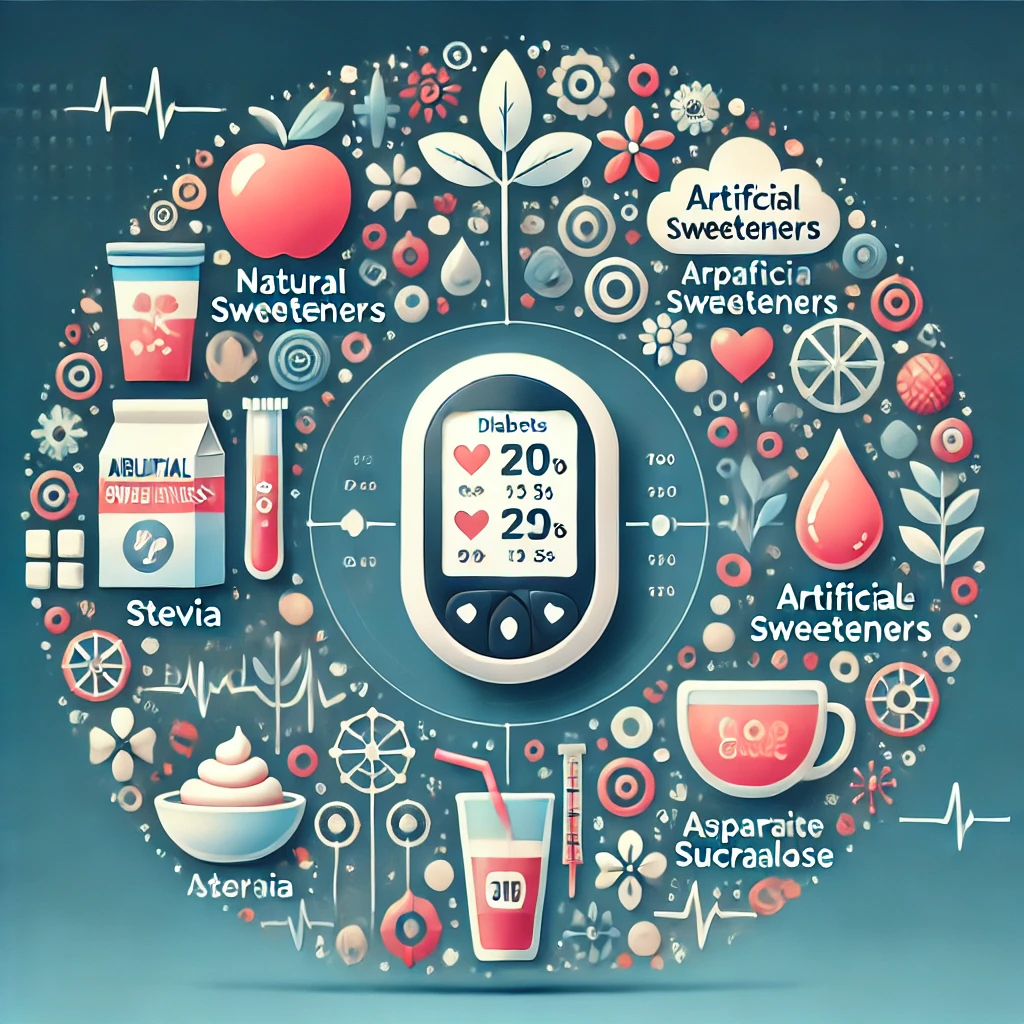Artificial Sweeteners and Diabetes: Are Sugar Substitutes Safe?
Introduction
Managing diabetes involves careful attention to diet, especially sugar intake. Many people turn to artificial sweeteners as an alternative to regular sugar. But are these sugar substitutes safe for diabetics? Do they affect blood sugar levels or insulin sensitivity?
In this article, we will explore the impact of artificial sweeteners on diabetes, their potential risks, and the best alternatives for managing blood sugar levels effectively.
Understanding Artificial Sweeteners
Artificial sweeteners are sugar substitutes that provide a sweet taste without the calories of regular sugar. They are commonly used in sugar-free beverages, desserts, and processed foods.
Types of Artificial Sweeteners Approved for Use
The U.S. Food and Drug Administration (FDA) has approved the following artificial sweeteners:
- Aspartame (Equal, NutraSweet)
- Saccharin (Sweet’N Low)
- Sucralose (Splenda)
- Acesulfame potassium (Sunett, Sweet One)
- Neotame (Newtame)
- Advantame
These sweeteners are much sweeter than sugar and require only small amounts to sweeten foods and drinks.
Do Artificial Sweeteners Affect Blood Sugar Levels?
Unlike regular sugar, artificial sweeteners contain little to no calories and do not directly raise blood sugar levels. However, some studies suggest that long-term use could impact insulin sensitivity and gut health.
Impact of Artificial Sweeteners on Blood Sugar
| Sweetener | Effect on Blood Sugar |
|---|---|
| Aspartame | No direct impact, but controversial for metabolic health |
| Sucralose | May cause insulin spikes in some individuals |
| Saccharin | Minimal effect, but may disrupt gut microbiota |
| Acesulfame K | No major blood sugar impact |
| Stevia | Natural alternative, considered safe |
While these sweeteners do not cause an immediate spike in blood sugar, research is ongoing regarding their long-term metabolic effects.
Best Sugar Alternatives for Diabetes Management
For those managing diabetes, natural and low-glycemic alternatives may be a better option. Here are some of the best choices:
1. Stevia
- 100% natural and derived from the stevia plant
- Zero calories and does not raise blood sugar levels
- Considered one of the safest sweeteners for diabetics
2. Monk Fruit Sweetener
- Natural, zero-calorie sweetener
- Contains antioxidants that may help reduce blood sugar spikes
- Sweeter than sugar, so only small amounts are needed
3. Erythritol
- Sugar alcohol with a low glycemic impact
- Does not cause insulin spikes
- Found naturally in some fruits
4. Xylitol
- Another sugar alcohol, but has some impact on blood sugar
- Beneficial for oral health, reducing the risk of cavities
These alternatives offer safe ways to enjoy sweetness while managing blood sugar levels effectively.
Potential Health Risks of Artificial Sweeteners
While artificial sweeteners are FDA-approved, some studies suggest potential risks for long-term use, particularly in diabetics.
1. Insulin Sensitivity Issues
Some studies indicate that artificial sweeteners may reduce insulin sensitivity, making it harder for the body to process glucose effectively.
2. Gut Health Disruptions
Artificial sweeteners may alter gut microbiota, which can affect metabolism and increase the risk of insulin resistance.
3. Increased Sugar Cravings
Although artificial sweeteners satisfy sweet cravings, they may increase cravings for sugary foods, leading to poor dietary choices.
Natural vs. Artificial Sweeteners: Which Is Better?
When it comes to diabetes management, choosing the right sweetener is crucial. Here’s a comparison:
| Type | Examples | Effect on Blood Sugar | Safety |
|---|---|---|---|
| Artificial Sweeteners | Aspartame, Sucralose, Saccharin | No immediate impact, but may affect insulin sensitivity | Some health concerns |
| Natural Sweeteners | Stevia, Monk Fruit | No impact on blood sugar, natural antioxidants | Generally safe |
| Sugar Alcohols | Erythritol, Xylitol | Low glycemic index, minimal impact | Can cause digestive issues in large amounts |
For most diabetics, natural sweeteners like stevia and monk fruit are the best options for long-term health.
FAQs
1. Are artificial sweeteners completely safe for diabetics?
Most artificial sweeteners are FDA-approved, but some research suggests they may impact metabolism and gut health over time. Natural alternatives may be a better choice.
2. Do artificial sweeteners help with weight loss?
Since they have fewer calories than sugar, they can help reduce overall calorie intake, but they may also increase sugar cravings, leading to overeating.
3. What is the safest sweetener for diabetes?
Stevia and monk fruit sweeteners are the safest choices as they are natural and have no impact on blood sugar.
4. Can artificial sweeteners raise insulin levels?
Some studies suggest that sweeteners like sucralose may trigger insulin spikes, even without raising blood sugar.
5. How do I transition from sugar to artificial sweeteners?
Start by gradually reducing sugar intake and replacing it with stevia, monk fruit, or erythritol. Check food labels for hidden artificial sweeteners.
Conclusion
Artificial sweeteners provide a sugar-free alternative for diabetes management, but they may not be the best long-term solution for everyone. Natural sweeteners like stevia and monk fruit offer a safer, healthier way to satisfy sweet cravings without impacting blood sugar levels.
If you’re managing diabetes, consider speaking to a healthcare professional before making significant changes to your diet.
📩 Subscribe to our newsletter for more diabetes management tips and healthy eating guides!
